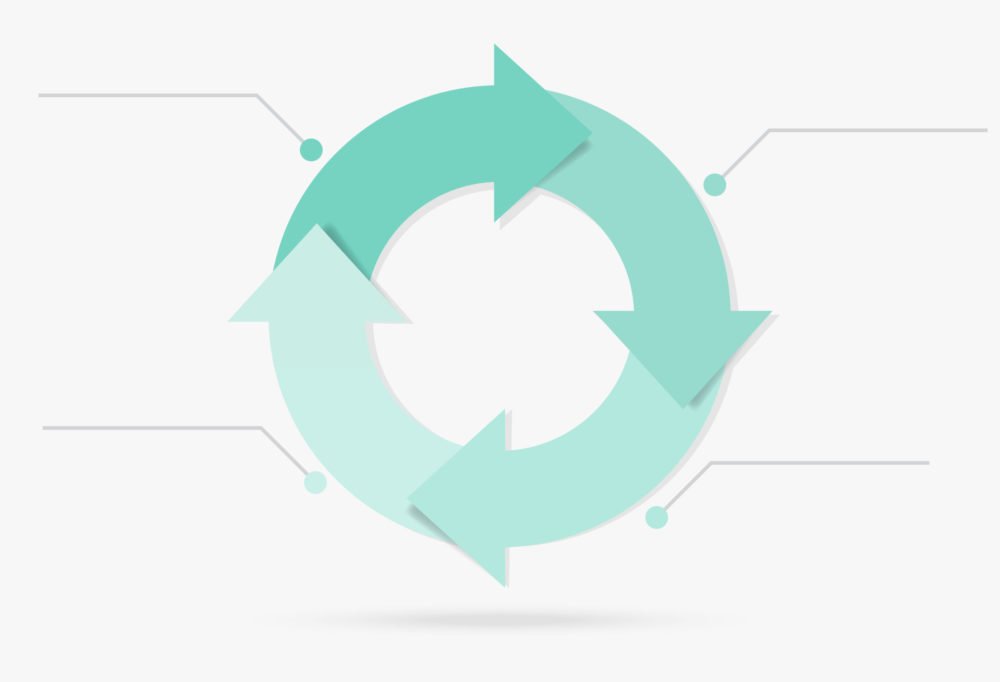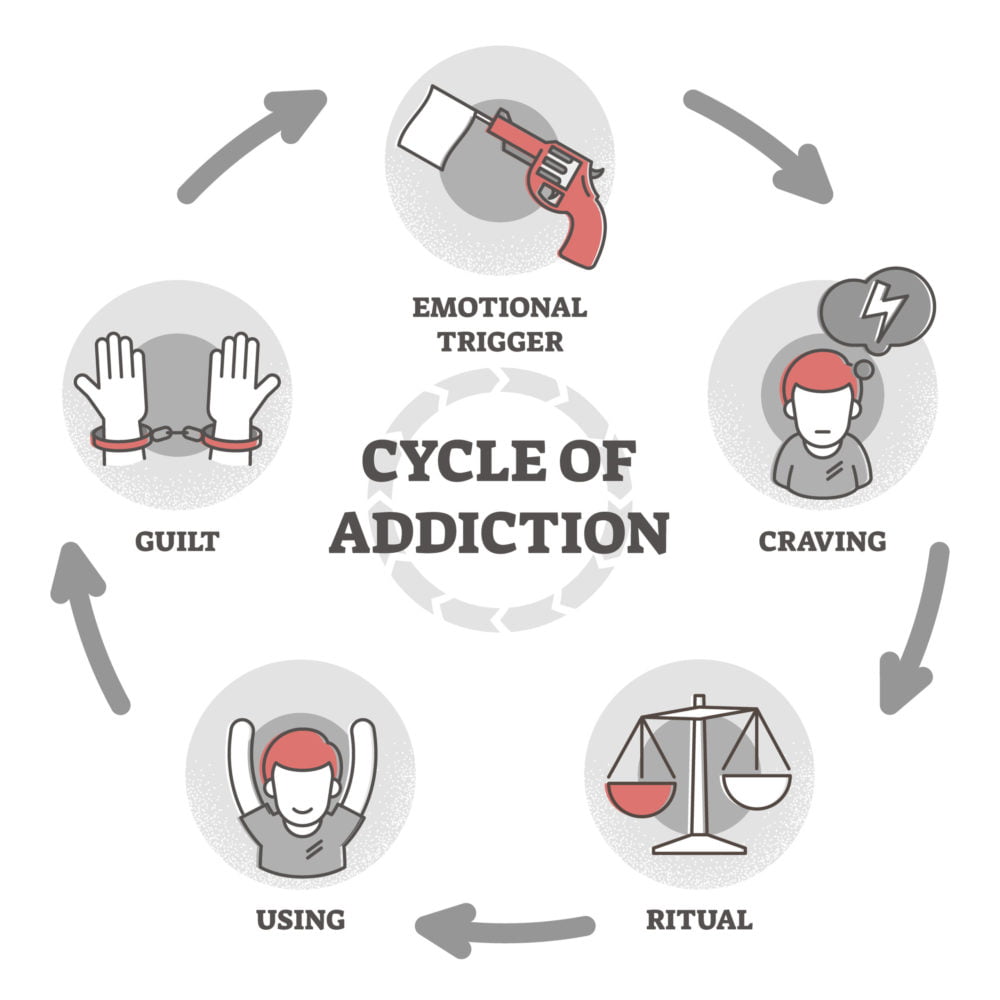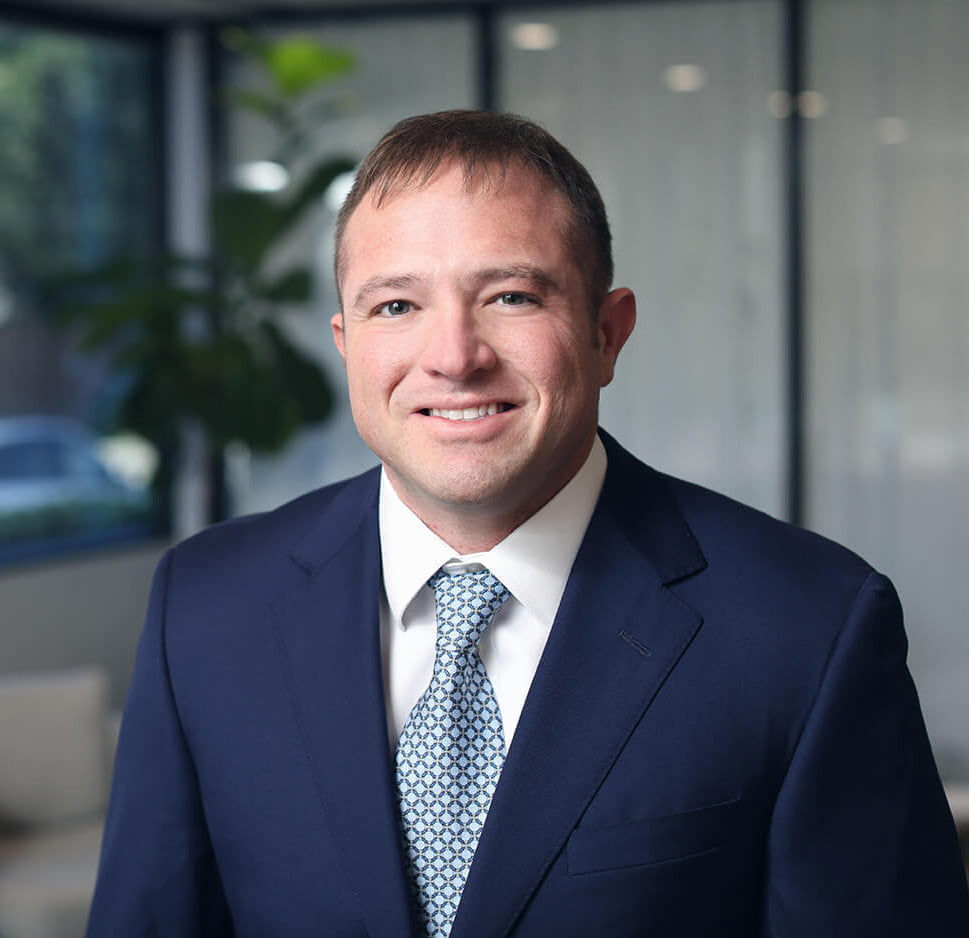Explaining the Cycle of Addiction

Addiction doesn’t just happen overnight. It also doesn’t automatically happen just because you had a drink or two that one time or tried an illicit substance once. Addiction is a chronic brain disease that is a result of a chemical imbalance and develops over time.
There are several different stages when it comes to the addiction cycle. Keep reading to learn more about the cycle of addiction and how you or a loved one can recover before it’s too late.
What Is Addiction?
 Before explaining the cycle of addiction and its different stages, it’s important to have a better understanding of the concept of addiction.
Before explaining the cycle of addiction and its different stages, it’s important to have a better understanding of the concept of addiction.
As we mentioned in the introduction, addiction is a chronic brain disease. That means that nobody chooses to suffer from addiction. Just like other diseases, certain factors can cause a person to develop an addiction to drugs and alcohol over time.
In the case of drug and alcohol addiction, the substance or substances of abuse affect the part of the brain that controls motivation, pleasure, memory, and reward. Over time, the brain begins to realize that these substances produce feelings that it likes.
As a result, it begins to crave these substances until a point is reached where it thinks that it needs these substances to function. It is at this point that the brain and body are suffering from addiction.
What is the Cycle of Addiction?
The cycle of addiction is a term used to describe the various stages of the development of an addiction. Each stage has its own set of thoughts, actions, and emotional triggers that lead the person struggling to the next stage. The cycle will often continue in an endless loop until the person suffering makes an active effort to get help for their addiction through treatment.
Even once treatment has been completed, temptations and triggers can pop up that might tempt someone to enter back into the cycle of addiction. That’s why recovery is a lifelong journey and something that you have to work on every day.
What Are the Stages of Addiction?
As we mentioned, addiction takes time to develop. Someone who has one drink won’t immediately become an alcoholic. In fact, completing the full addiction cycle can take months or even years depending on a variety of factors including genetics, environment, and pre-existing mental health conditions.
There are 5 general stages of addiction, all of which together complete the cycle of addiction. The stages are:
- Initial Use/Experimentation
- Abuse
- Tolerance
- Dependence
- Addiction
Experimenting with drugs and alcohol and trying them for the first time is often considered a right of passage in our society. Whether the first time you have a drink or try an illicit substance happens in high school, college, or at another time it often occurs in a social setting where you feel like it’s something you have to do. This sense of peer pressure can either be perceived or it can be real.
While most people’s first time using a substance is in a social setting or for recreational purposes, that isn’t always the case. The first time you have prescribed medication, whether it be a painkiller, an antidepressant, or any other prescription drug that can be abused, that also technically falls under the “initial use” stage.
Initial use does not automatically mean that an addiction will develop. Many people can use illicit substances and never experience any of the effects of dependency or addiction. However, for someone that does develop a substance abuse problem initial use is the first stage.
As we mentioned, many people never get past the initial use stage. They can enjoy a drink or the occasion illicit substance without any major negative consequences. However, the next stage in the addiction cycle is abuse.
Abuse occurs when someone improperly uses a substance or substances. This can mean that they drink too much alcohol or they take a drug in a manner other than medically directed.
If the substance is legal then abuse is defined as using it in an improper way such as drinking or taking too much or taking a drug for a reason other than its intended medical use. If a substance has no real medical use or isn’t typically medically prescribed, such as heroin, then it can be considered abuse the first time it is taken.
Once someone has used and abused a substance or substances for a long enough period of time, they begin to build up a tolerance for said substance or substances. This means that they need more of the substance to reach their desired effects.
Tolerance occurs as a result of a change in the chemical makeup of the brain. As a result, the amount of alcohol or the dosage of the drug is no longer enough to produce the effect that the brain is used to for that substance. When this happens the brain needs more of the substance to feel its effects.
This change in chemical makeup, as well as how the brain reacts to the substance, is a sign that dependence is starting. Once the dependence stage occurs, the brain is so hooked on the substance that it thinks that it needs it to function properly. The brain might no longer be able to experience certain feelings or emotions without that substance being in your system.
It’s important to remember that just because you are dependent on a substance doesn’t mean you are addicted to it. People often become dependent on a substance for medical reasons. While they do need the drug to function properly, they are still able to go about their life in a fairly normal matter.
When someone becomes dependent on a substance for a non-medical reason though, that can lead to addiction. For substance use or abuse to be considered an addiction, the following criteria have to be met:
- Using the substance in ways other than medically directed
- Being unable to stop using the substance
- Experiencing cravings for the substance
- Experiencing withdrawal symptoms when the substance isn’t in the body
- Dealing with relationship issues as a result of the substance use
- Losing interest in activities
- Dealing with negative impacts in your daily life such as struggling at work or school as a result of your substance use
- Continuing to use and abuse the substance despite the negative effects it’s causing
- Using substances in dangerous situations (ie drinking and driving)
The number of symptoms listed above that you suffer from determines the severity of the addiction.
- 1-3 symptoms – mild disorder
- 4-5 symptoms – moderate disorder
- 6+ – severe addiction

How Can I Break the Cycle of Addiction?
It’s not uncommon for someone stuck in the addiction cycle to try and break it on their own. They might try and stop using the substance of abuse on their own before eventually succumbing to their cravings and ending up back in the cycle again.
The safest, and most successful way to break the cycle of addiction is to seek professional help and enter into an addiction treatment program.
The first step in the treatment process is to undergo detox. Detoxing is done to rid the body of all the harmful substances that are in it so that the body can begin to heal.
Due to the nature of detoxing and the withdrawal symptoms associated with it, detox treatment should be done under the care and supervision of trained medical professionals at either a local medical facility, a dedicated detox center, or a treatment center that also offers detox treatment like ours at LUNA Recovery.
Attempting to self-detox can be dangerous and even life-threatening.
Once detox has been completed, the next step is to enter into a treatment program. Depending on the severity of your addiction as well as what works best for your needs, our medical professionals will recommend and create a custom treatment plan for you.
At LUNA Recovery we offer a variety of treatment options for many different substances of abuse including:
- Inpatient Treatment
- Outpatient Treatment (OP)
- Intensive Outpatient Treatment (IOP)
- Partial Hospitalization Program (PHP)
- Adolescent Treatment
Regardless of the treatment plan you and your treatment professional choose, treatment will be largely focused on various types of therapies and therapy sessions. Therapy is designed to help better understand how your addiction developed as well as learn new, healthier ways to deal with triggers and cravings when they arise moving forward.
Do You Want To Break the Addiction Cycle?
Whether you have tried to break the cycle of addiction on your own and it hasn’t worked or you are new to the addiction cycle, it is never too late to get help. For more information about how we can help you break the cycle of addiction, contact us today.
Dr. Allaire received his Bachelors of Science in Biology from the University of Houston, as Valedictorian of the College of Natural Sciences and Mathematics, and his Medical Doctorate from Baylor College of Medicine, where he served as Chief Resident. He is the medical monitor for the Physician Counseling Committee of the Harris County Medical Society and the Medical Director of Serenity House Detox. Dr. Allaire specializes in medically assisted detox cases, treating patients in recovery from addiction or other mental health disorders, the medical assessment and monitoring of patients with addictive disorders, medical care related to eating disorders and the medical treatment of patients with mental health conditions.



